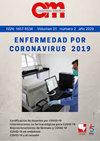Lifestyle and cancer prevention in female employees at a health institution
IF 0.7
4区 医学
Q3 MEDICINE, GENERAL & INTERNAL
引用次数: 3
Abstract
Objective: To establish the relationship between lifestyle for prevention of cervix and breast cancer and perceptual cognitive factors from the Pender model in working women. Materials and methods: Correlation and cross-sectional study with a random sample of 143 working women. The Lifestyle index is the total score of 5 variables: Papanicolau test, breast self-exam, physical activity, body mass index, and cigarette smoking. Results: The mean age for the sample was 44.4 + 6.2; 87% of the women had higher education and 85% were working in health care services. A total of 89% of the women had unhealthy lifestyles because of the lack of regular physical activity, not having a Papanicolau test according to the norm, not practicing breast self-exams, and having an altered body mass index. There was significant correlation between lifestyle and occupation, and also with self-efficacy perception for breast self-examination. Conclusion: The lifestyles for most of the women sampled were unhealthy. Recommendations: It is also recommend conducting culturally sensitive healthcare campaigns in addition to setting up flexible attention schedules for women.某卫生机构女雇员的生活方式与癌症预防
目的:利用Pender模型,探讨职业女性预防宫颈癌和乳腺癌的生活方式与感性认知因素的关系。材料与方法:随机抽样143名职业妇女进行相关性和横断面研究。生活方式指数是5个变量的总分:Papanicolau测试、乳房自检、身体活动、体重指数和吸烟。结果:患者平均年龄44.4±6.2岁;87%的妇女受过高等教育,85%的妇女在保健服务部门工作。总共有89%的妇女生活方式不健康,原因是缺乏定期的体育活动,没有按照标准进行帕帕尼科劳检查,没有进行乳房自我检查,以及体重指数改变。生活方式与职业、乳房自检自我效能感存在显著相关。结论:大部分受访女性的生活方式不健康。建议:除了为妇女制定灵活的关注时间表外,还建议开展具有文化敏感性的保健运动。
本文章由计算机程序翻译,如有差异,请以英文原文为准。
求助全文
约1分钟内获得全文
求助全文
来源期刊

Colombia Medica
MEDICINE, GENERAL & INTERNAL-
CiteScore
2.00
自引率
0.00%
发文量
11
审稿时长
>12 weeks
期刊介绍:
Colombia Médica is an international peer-reviewed medical journal that will consider any original contribution that advances or illuminates medical science or practice, or that educates to the journal''s’ readers.The journal is owned by a non-profit organization, Universidad del Valle, and serves the scientific community strictly following the International Committee of Medical Journal Editors (ICMJE) and the World Association of Medical Editors (WAME) recommendations of policies on publication ethics policies for medical journals.
Colombia Médica publishes original research articles, viewpoints and reviews in all areas of medical science and clinical practice. However, Colombia Médica gives the highest priority to papers on general and internal medicine, public health and primary health care.
 求助内容:
求助内容: 应助结果提醒方式:
应助结果提醒方式:


